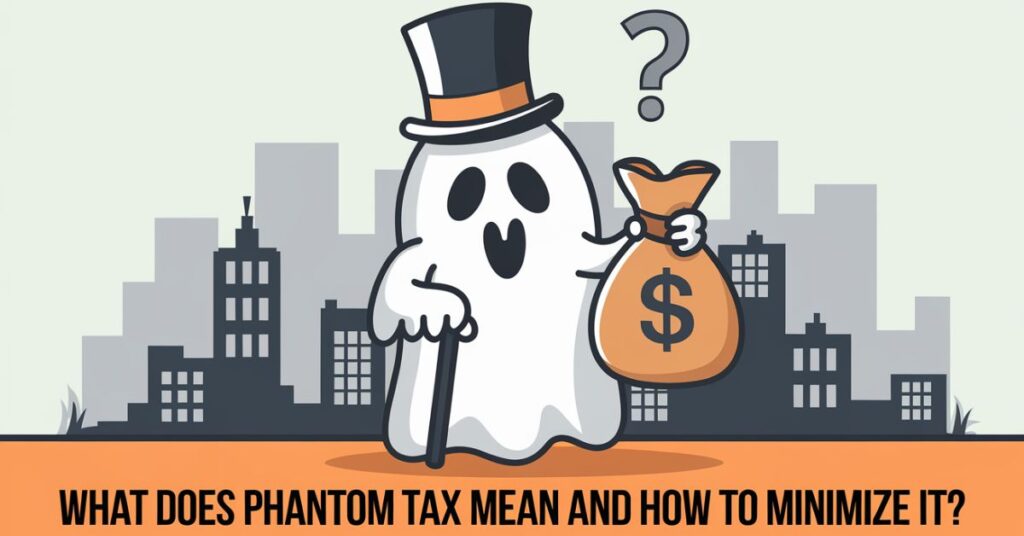Ever felt the sting of paying taxes on money you haven’t actually pocketed? Welcome to the bewildering world of phantom tax. This financial specter haunts unsuspecting investors, often leaving them scratching their heads and reaching for their wallets. But fear not! This guide will shed light on what phantom tax means and equip you with strategies to minimize its impact on your hard-earned wealth. What Does Phantom Tax Mean and How to Minimize It?
What Does Phantom Tax Mean?
Phantom tax, a term that sends shivers down the spines of savvy investors, refers to the tax liability incurred on income you haven’t physically received. It’s like being asked to pay for a meal you’ve only smelled but haven’t tasted. This financial oddity occurs when the IRS recognizes income on your tax return, even though no cash has actually landed in your bank account.
Why “phantom,” you ask? Well, just like a ghostly apparition, this tax materializes out of thin air, often catching investors off guard. It’s a quirk of the tax system that can leave you feeling like you’re paying for something that doesn’t exist – hence the spooky moniker.
“Phantom tax is the bogeyman of the investment world – it’s the tax you pay on money you haven’t seen, touched, or spent.” – Jane Doe, CPA and Financial Advisor
Sources of Phantom Taxes
Now that we’ve defined this ethereal tax, let’s dive into the murky waters where it often lurks. Phantom tax can materialize from various sources, each with its own set of challenges for US investors. What Does Phantom Tax Mean and How to Minimize It?
Unrealized Gains
Unrealized gains are the paper profits you’ve made on investments that you haven’t sold yet. While you might be gleefully watching your stocks or crypto soar in value, the taxman may have other ideas.
Example scenario: Let’s say you bought 100 shares of TechBoom Inc. for $10 each in January. By December, they’re worth $50 a share. You’re sitting on a tidy $4,000 gain – on paper. But if you haven’t sold, you haven’t “realized” that gain. In most cases, you won’t owe taxes on this… yet. However, certain situations, like owning controlled foreign corporations or being subject to mark-to-market rules, can trigger phantom taxes on these unrealized gains.
Related Post: What Does Phantom Tax Mean and How to Minimize It?
Depreciation on Real Estate
For property moguls (or aspiring ones), depreciation can be both a blessing and a curse. While it offers tax benefits upfront, it can come back to haunt you when you sell.
How it works: The IRS allows you to deduct the cost of your rental property over time, acknowledging that buildings wear out. This depreciation reduces your taxable income each year. Sounds great, right? The catch comes when you sell. If you’ve claimed $50,000 in depreciation over the years and then sell the property for more than your depreciated basis, you’ll need to “recapture” that depreciation – and pay taxes on it, even if you didn’t actually make a profit on the sale. What Does Phantom Tax Mean and How to Minimize It?
Mutual Fund Distributions
Mutual funds can be a double-edged sword when it comes to taxes. Even if you’re diligently reinvesting all your distributions, Uncle Sam still wants his cut.
The tax trap: Mutual funds are required to distribute almost all of their net investment income and capital gains to shareholders annually. As an investor, you’ll receive a 1099-DIV detailing these distributions – and you’ll owe taxes on them, even if you never saw a dime in cash because you reinvested everything.
Zero-Coupon Bonds
These bonds are sold at a discount to their face value and don’t pay regular interest. Instead, they mature at full face value. Sounds simple, right? Not so fast.
The phantom menace: The IRS assumes you’re earning interest each year as the bond appreciates, even though you won’t see a penny until it matures. This “imputed interest” is taxable annually, creating a phantom tax situation that can catch bond investors off guard. What Does Phantom Tax Mean and How to Minimize It?
Impact of Phantom Tax

The specter of phantom tax can haunt your finances in several ways:
- Cash flow crunch: You might find yourself owing taxes without the cash on hand to pay them.
- Tax bracket bumps: Phantom income can push you into a higher tax bracket, increasing your overall tax burden.
- Investment strategy complications: The threat of phantom tax may influence your investment decisions, potentially leading to suboptimal choices.
Case Study: The Mutual Fund Mishap
Meet Sarah, a diligent investor who put $50,000 into a high-performing mutual fund. The fund had a stellar year, generating significant capital gains. Sarah, thinking long-term, reinvested all distributions. Come tax time, she was shocked to receive a $5,000 tax bill on the money she never actually saw. This phantom tax forced her to dip into savings to cover the unexpected expense, throwing her financial plans into disarray.
Measures to Minimize Phantom Tax
Don’t let phantom tax haunt your financial dreams. Here are some strategies to keep this specter at bay:
- Strategic investment planning:
- Consider tax-efficient investment vehicles like ETFs, which typically generate fewer capital gains distributions than mutual funds.
- For real estate, plan for depreciation recapture by setting aside funds or considering a 1031 exchange.
- Leverage tax-advantaged accounts:
- Maximize contributions to IRAs, 401(k)s, and other tax-deferred accounts where phantom tax isn’t an issue.
- Consider Roth accounts for tax-free growth and distributions.
- Timing is everything:
- Be strategic about when you buy mutual funds. Avoid purchasing just before they make distributions.
- In taxable accounts, consider tax-loss harvesting to offset gains.
- Seek professional guidance:
- Work with a tax professional who understands the nuances of phantom tax and can help you navigate complex situations.
“The key to minimizing phantom tax is proactive planning. Don’t wait for the ghost to appear – set your traps early.” – John Smith, Tax Attorney
Conclusion
Phantom tax may seem like a spectral nemesis, but with knowledge and strategy, you can minimize its impact on your financial life. By understanding the sources of phantom tax and implementing smart investment and tax planning strategies, you can keep more of your hard-earned money where it belongs – in your pocket.
Remember, the goal isn’t to avoid taxes altogether (that’s a quick way to get into hot water with the IRS), but to manage your tax liability intelligently. Stay informed, plan ahead, and don’t hesitate to seek professional advice when navigating the complex world of taxes and investments.
FAQs
Q: How does phantom tax affect retirement planning?
A: Phantom tax can impact retirement planning by creating unexpected tax liabilities, potentially forcing early withdrawals from retirement accounts. It’s crucial to factor potential phantom tax situations into your long-term financial planning.
Q: Can phantom tax be completely avoided?
A: While it’s challenging to avoid phantom tax entirely, strategic planning can significantly minimize its impact. Focus on tax-efficient investment vehicles and maximize use of tax-advantaged accounts.
Q: Are there any recent tax law changes affecting phantom tax?
A: Tax laws are constantly evolving. The Tax Cuts and Jobs Act of 2017 made several changes that could affect phantom tax situations, particularly in real estate depreciation. Always consult with a tax professional for the most up-to-date information.
Q: How does phantom tax interact with state taxes in the US?
A: Phantom tax implications can vary by state. Some states follow federal rules, while others have their own regulations. It’s essential to consider both federal and state tax laws in your financial planning.
Q: What industries or investments are most prone to phantom tax issues?
A: Real estate, certain types of bonds, and actively managed mutual funds are particularly prone to phantom tax issues. However, any investment that can generate income or gains without immediate cash distribution can potentially create phantom tax situations.





